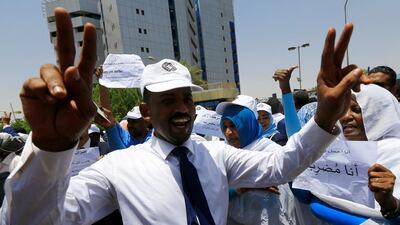The success of the two-day general strike in Sudan may have significantly strengthened the hand of the protest leaders who called it to press their demands for the country's ruling generals to surrender power to a civilian-led administration, but it remains unclear whether that will be enough to clinch a deal in their deadlocked negotiations.
While the stalemate poses a serious threat to Sudan's stability and already ailing economy, the passage of time without an agreement may benefit the generals who succeeded longtime ruler Omar Al Bashir after removing him from power on April 11.
The Tuesday-Wednesday strike was called after the two sides failed to agree on the composition and leadership of a "sovereign council" expected to function as a collective presidency during a transitional period. While the protest leaders are demanding that civilians lead and make up the majority of the 11-seat body, the military insists that it should headed by one of their own.
"The success of the strike has redrawn the map of Sudan's balance of power to the advantage of the street and the forces of change," Egyptian commentator Ashraf Al Barbary wrote in Cairo's independent Al Shorouk newspaper. The generals, he said, relied on their firepower and the conviction that the "spirit of the revolution and desire for change" would be eroded with the passage of time. "That did not happen and, by the looks of it, is not likely to."
The generals have threatened to call early elections if the negotiations remain deadlocked. The protest leaders say this would resurrect Mr Al Bashir's regime, with his Islamist backers returning to power. It would also exclude from the vote the estimated eight million people who have been displaced by the country's civil strife.
The generals also hope that protesters will tire of street activism and that internal divisions will undermine the coalition of political parties and trade unions that spearheaded four months of street protests against Mr Al Bashir's rule and which negotiates with the military now. The military made little effort to hide its pleasure when a key member of the coalition – former prime minister Sadeq Al Mahdi of the Umma Party – publicly stated his opposition to the strike.
The protests against Mr Al Bashir began in December. A sit-in protest outside the headquarters of the armed forces in Khartoum began on April 6 but continues to this day to press the military for civilian rule.
Hundreds of hardcore activists live in tents at the sit-in site, enduring the unforgiving summer heat while observing the dawn-to-dusk fast of the holy Muslim month of Ramadan, which ends next week. They are joined by thousands after nightfall, when the site takes on a carnival-like atmosphere.
Sudan's military, which has the support of regional powers such as Egypt and Saudi Arabia, is treading carefully to gain leverage on home turf, too. The generals have allowed a carefully weighed margin of freedom for supporters of Mr Al Bashir, allowing them to stage a demonstration in Khartoum earlier this month at which they chanted religious slogans against the mostly leftist and secular protest movement.
The generals have also lifted a freeze they had imposed on trade unions loyal to Mr Al Bashir, a move apparently designed to counter the weight of supporters of the protest movement in the country's workforce.
Pandering to popular fears of foreign meddling and to conspiracy theorists, the generals have also accused unnamed leaders of the protest movement of being “foreign agents” and cast doubt on the size of support they enjoy. In the meantime, they have gone to great lengths to project an image of themselves as protectors and guardians of the nation.
The military has ruled Sudan for more than 50 of the 63 years since independence, but fared no better than the democratically elected but dysfunctional governments it replaced.
The deadlock in the talks between the generals and protest leaders, and the growing distrust between them, could push the troubled Afro-Arab nation to breaking point.
Sudan's economy has been mired in mismanagement and corruption under Mr Al Bashir and the dominance of a clique of Islamists linked to his government. Essential commodities such as bread and fuel are often in short supply because of a lack of foreign exchange to import them. Lengthy power outages are not uncommon. The agricultural sector, the economy's backbone, is troubled by shortages of fuel and fertiliser.
Moreover, the country's resources are strained by the fight against three rebellions: in Darfur and the Nuba Mountains to the west, and in the Blue Nile state south of the capital Khartoum.
"If the two sides decide to escalate things, Sudan could suffer a complete meltdown," said Hany Raslan, a Sudan expert from Egypt's Al Ahram Centre for Political and Strategic Studies.
"Both sides must factor in the threats and challenges facing Sudan, which is standing on the edge of a cliff right now."


